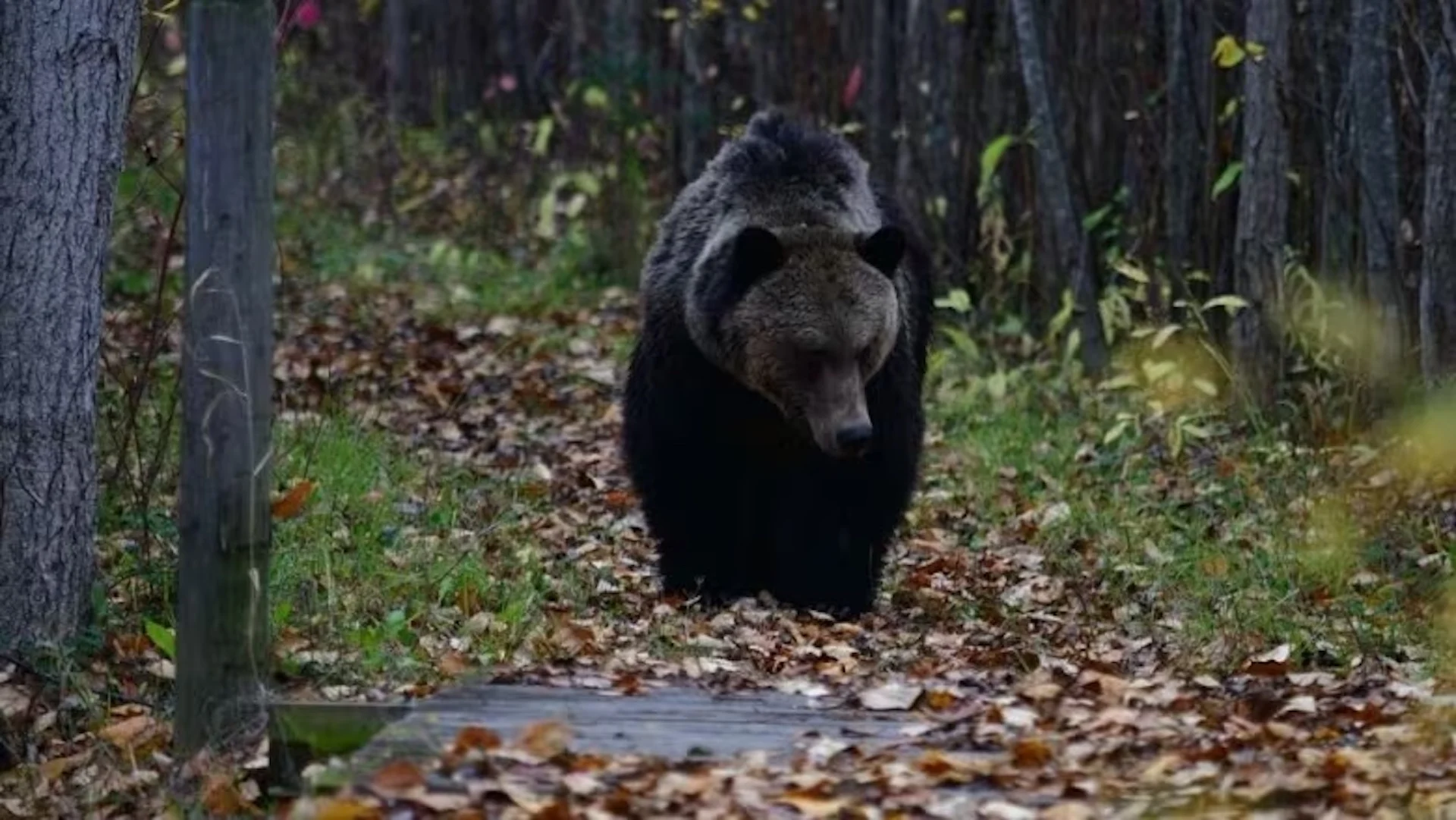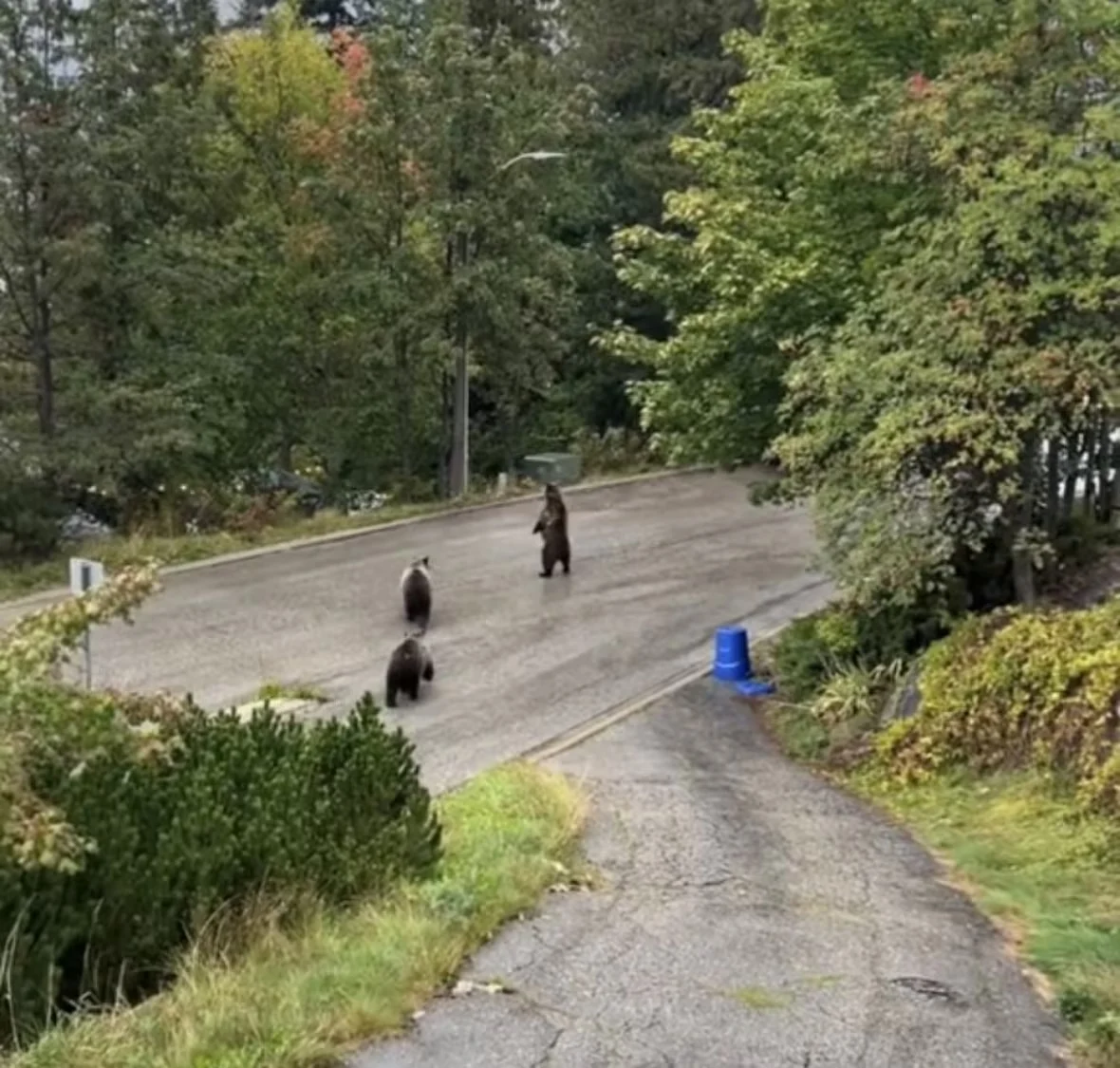
Grizzly bears roaming in B.C. cities reflect 'kind of a weird year' for wildlife
Schools and golf courses and trails, oh my!
An apparent spike in grizzly bear sightings in areas populated by people this year is forcing closures and sparking community action across British Columbia.
This week alone, the massive omnivores were responsible for the shuttering of an elementary school field, a park and a section of a golf course in Whistler. In the Kootenays, a family of grizzlies that just won't stay away from the city of Nelson has prompted trail closures and door knocking to remind residents how to avoid conflict with wildlife.
SEE ALSO: Close brush with hunting grizzly shows risk of encounter ahead of winter
And almost daily, social media posts show yet another grizzly sighting in an area where people reside or recreate.
Karen Powell, from Quesnel, B.C., turned to Facebook this week to share images of a grizzly lumbering along a trail in West Fraser Timber Park.
"Thank God, I lived to tell the story," she captioned her post.
So what's up with all these grizzlies roaming around B.C. communities?
"It's kind of a weird year," said Garth Mowat, a large carnivore specialist with the Ministry of Forests, Lands and Natural Resources.
Mowat said there is definitely more bear activity near people this year than the province has seen in the recent past and while he would like to pinpoint one reason, he says it's likely a combination of hot summer weather and low salmon returns.
"I think that the food this year might be less than other years," said Mowat.
Grizzlies are trying to fatten themselves up before they head into the mountains in about a month to den for the winter —and where there are people there is food.
Nelson resident Reagan Jewitt watched a mother and two cubs cruise through her yard on three nights this week. The bear family was trapped and relocated last week by conservation officers but they keep coming back.
Jewitt says the three bears are massive, with the cubs nearly as big as their mother now.
"It's quite majestic and magical to see them but [we're] definitely just being careful opening the doors to go outside," said Jewitt.
Mowat said the mama bear has a radio collar on and is being tracked by authorities who will not take action unless she appears aggressive with people.

A grizzly bear with two yearlings has returned to Nelson, B.C., after an attempted relocation. (Alii Simmonds)
"She is a bit nonchalant how she moves through town perhaps but we are just watching her and hoping that when the apples finally run out she will move back to wherever she lived before," he said. "It's a small chance that anyone will be hurt, but there is a chance."
To reduce that risk, he said a WildSafeBC co-ordinator is going to door-to-door in Nelson to remind people to secure their garbage so the bears don't get wind of waste and stick around.
Bruce McLellan, a wildlife ecologist with over forty years of experience studying bears in B.C., said grizzly populations have grown in the Southern Selkirk Mountains near Nelson in recent decades.
He also said that while some South Coast grizzly groups are not faring well, a particular population located west of Whistler has grown at about three per cent a year for the last 20 years.
"They are becoming more and more commonly seen and people are becoming concerned," said McLellan, speaking on BC Today.
WATCH: Meet 'The Boss' one of the biggest and baddest grizzlies in Alberta
The municipality has closed Balsam Park, the adjacent soccer field at Myrtle Phillip Elementary School and a section of nearby trails to reduce the risk of surprise encounters with bears.
"Surprise is a major thing that tips bears and makes them all revved and excited," said McLellan.
But McLellan said having grizzlies in Whistler is not particularly new.
He recalls a grandmother bear who wandered into Whistler Village about a decade ago and, because she had a tracking device on her, it was apparent she spent three days in the centre of town and no one saw her.
"In general, I have found that when bears are down closer to people they know people are around and generally they are on better behaviour," he said.
People can also practise better bear behaviour, such as securing garbage, keeping a safe distance and installing electric fencing around gardens and orchards.
The B.C. Conservation Service asks people who see aggressive or threatening bears to call 1-877-952-7277. Learn more about co-existing with bears and how to avoid encounters at WildSafeBC.com.
The province keeps a monthly record of calls received for grizzly bear sightings and, while September statistics are not yet available and October's are still calculating, there were 106 calls in August compared to 76 during the same month last year.
Thumbnail courtesy of Karen Powell via CBC.
The story was written by and published for CBC News. It contains files from Radio West and BC Today.










